-
Passing Down the God Stories
Written by Michelle J. Goff, Founder and Director of Iron Rose Sister Ministries
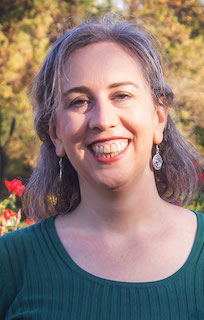
On the 4th of July (Independence Day), we sat outside at Grandpa and Grandma’s farm, watching the fireworks in the distance and delighting in our annual tradition of root beer floats. Those grandparents are no longer with us, but my nephew and niece have been warned by their mom that they will hear that story every time we enjoy Independence Day fireworks with family, sipping root beer.
On the maternal side of the family, Granddaddy loves to tell jokes. He collected them for years as a speech professor and occasional preacher. As kids, whenever we heard a good joke, we would call him up and retell it. These days, he regales us with his favorites, telling them as if for the first time. When he asks, “Have you heard that one?”, one sister has learned to cleverly respond, “Not today!” The first time he caught on to her joke, he winked, laughed, and said, “Oh, you’re definitely part of this family with that sense of humor!”
Whether time-honored traditions or long-standing jokes, we celebrate the connections they bring. From both sides of my family, another connection is their legacies of faith. I know this because of the stories passed down.
The Iowa grandparents led a quiet life as farmers. The Florida two were teachers in a big city, rampant with worldly influence. Both couples were challenged to live out their faith in their respective contexts. And since we grandkids lived at least an 18-hour car ride from the nearest, we relied more heavily on our parents to pass down the generational stories of faith.
Prayer was a vital lifeline for all four grandparents. Dean and Evelyn prayed that their crops would produce a harvest ample enough to sell and provide for their own needs. They prayed over whether they should take my dad and aunt in as teenagers (as foster parents). They prayed that God would provide preachers for their one-room church building, built by previous generations.
George and Barbara prayed that God would use them to plant seeds of truth and faith in their students. They prayed that God would lead them in starting a nonprofit called Christian Homes for Children in South Florida and use them to bless children who were not able to receive loving care in other places. George even wrote a book, Prayer Power, contributing the proceeds from book sales to that foster care ministry. Even earlier this year, Grandmommy wanted to pray with whichever family member visited her hospital room.
Their “God stories,” as I have endearingly termed them, remind me of God’s faithfulness throughout all generations and have inspired me in how I live out my own faith.
My mom, a gifted storyteller, has created an expectation that we share the God stories. We cannot keep them to ourselves! She never passes up an opportunity to demonstrate how she saw God working, and it doesn’t matter whether the other person is a believer. Her story becomes an intentional invitation to allow Him to author their story.
The beautiful thing is that the more we tell God stories and recognize His hand at work, the more we see Him and invite Him to be the living, active, all-powerful God that He is in our lives.
In a recent conversation, already needing to get back to work, I asked a couple of friends to give me five more minutes to share the full backstory of connections, because only then would the bigger God story of it all be revealed. Neither hesitated in granting my request, anticipating how they would be blessed by hearing it all come together as only God could orchestrate.
The following five minutes cannot be summarized in an 800-word blog post. I would need a map to illustrate what parts of the world I was referring to (five countries on three continents). Hand motions were required to draw connections, from the family where the story began through the interweaving of other families’ lives. We fast-forwarded and rewound our timeline as we navigated the intricacies of the tapestry God was creating. And yes, I showed pictures.
Iron Rose Sister Ministries and hundreds, maybe thousands, of women are reaping the blessing of those interconnected, generational God stories being passed down… and I’m only referring to that morning’s snippets of those families’ entwined God stories (Wyatt, Holland, Goff, Fincher, White, Yarbrough, Brizendine, and Batres).
The best part is that the eternal impact and blessing of the story is not yet fully written. The oldest generation has gone before us, leaving their legacy. It is our responsibility to carry on and pass down their stories of faith.
We may doubt our impact while on this earth. Yet when we share God stories that narrate another person’s faith, we affirm the ripple effect of one life on the legacy of God’s faithfulness.
I cannot wait to hear the God stories to come! Hopefully in heaven, God will gloriously reveal the millions of backstories, faithfully passed down. Oh, to sing those stories with the angels and the thousand generations (Deut. 7:9)!
What God story can you pass down or be a part of today?
-
Perfectly Designed Covenant
Written by Kat Bittner, volunteer with and Board member of Iron Rose Sister Ministries in Colorado
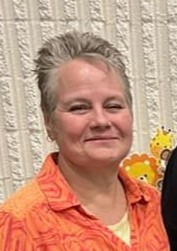
There is a common idiom in English, “marriage made in Heaven,” which implies that a particular marriage is perfect. Yet marriage is never perfect because we are imperfect beings. Marriage was designed by the perfect God, created because God declared, “It is not good that man should be alone; I will make him a helper comparable to him” (Gen. 2:18, NKJV). God Himself brought two humans together, man and woman, in order that they would become one (Gen. 2:22,24). It stands to reason that this God-ordained covenant (a promise between two or more people) should be treated carefully and with respect. God designed marriage to be a covenant between one man and one woman with Him at the head of that union.Consequently, we should be mindful of how we do marriage given the gravity of that covenant. And we could learn from some biblical examples of couples “doing marriage” in and out of God’s design.
Abram and Sarai: God had special plans for Abram. His wife, Sarai, chose to intervene by bringing another woman into their marriage to provide the child that she could not. Having this Egyptian woman, Hagar, bear Abram’s son would prove distressing for all (Gen. 16; 21:8-18). Sarai even grew angry at her husband, laying blame on him for the trouble she caused. “You are responsible for the wrong I am suffering. I put my slave in your arms, and now that she knows she is pregnant, she despises me”(Gen. 16:5, NIV). Sarai would have done well to let God move in their marriage the way He had already planned because God would later fulfill an even greater covenant through Abraham and Sarah’s marriage.
I will make you very fruitful; I will make nations of you, and kings will come from you… I will bless her and will surely give you a son by her. I will bless her so that she will be the mother of nations; kings of peoples will come fromher. (Gen. 17: 6,16)
Joseph and Mary: Even before the actual ceremony, Joseph perceived his marriage covenant with honor and respect. Upon finding out his bride-to-be was pregnant, Joseph chose to break their engagement quietly because he “was a righteous man and did not want to disgrace her publicly” (Matt. 1:19, NLT). He did this even though it was within his authority under the law to publicly condemn Mary. And Mary, a woman highly favored by God, accepted God’s will and His plans for her. I suppose Mary could have chosen another path that did not include Joseph, or just outright rejected God’s desire. However, Joseph and Mary valued the Lord’s design for their marriage and obeyed His will (Luke 1:18-24).
Hosea and Gomer: A union expressly made by God, this marriage was a picture of His love and faithfulness. It was between a prophet and a harlot, used by God in a unique way. Their marriage illustrated the covenant God had with the Israelites not to love any other gods. Hosea and Gomer’s marriage also typified the habitual breaking of that covenant. Gomer wandered unfaithfully from her marriage to Hosea. Hosea repeatedly brought Gomer home only to have her run into the arms of another lover, and God would expect Hosea to go get his wife and bring her home yet again.
Then the Lord said to me, ‘Go and love your wife again, even though she commits adultery with another lover. This will illustrate that the Lord still loves Israel, even though the people have turned to other gods and love to worship them.’ (Hos. 3:1)
Hosea’s and Gomer’s marriage was a living parable that God’s people could see for themselves.
Aquila and Priscilla: Considered a spiritual power couple, Aquila and Priscilla embodied the marriage covenant as God intended. They worked in expanding the church and were instrumental in keeping Paul and his ministry thriving (Rom. 16:3-4). They were church planters (1 Cor. 16:19), spiritual mentors (Acts 18:26), and traveling missionaries (Acts 18:18). All this married couple did for the Lord, they did together. They are an example of how to do marriage covenant as God perfectly designed it.
Marriage will never be perfect because we are imperfect beings. However, we should strive for excellence in marriage because we have the blood of Jesus, the perfect One, to sanctify us and make us holy(Heb. 13:12). Jesus perfects us! He makes us righteous! We need Him to perfect our marriage and make it right.It is an honorable thing to have a “marriage made in Heaven” because the marriage covenant is holy, designed by the perfect God to be at the head of that covenant. How will you honor the marriage covenant?
-
Prayer Warriors, Prepare for Battle
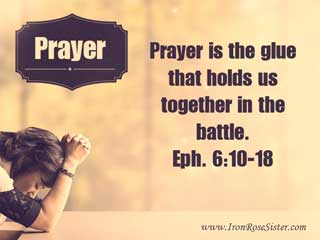 Paul, in his letter to the Ephesians, refers to the spiritual battle we each face. As his final admonition, he encourages the Ephesians to “Put on the full armor of God, so that you can take your stand against the devil’s schemes” (Eph. 6:11).
Paul, in his letter to the Ephesians, refers to the spiritual battle we each face. As his final admonition, he encourages the Ephesians to “Put on the full armor of God, so that you can take your stand against the devil’s schemes” (Eph. 6:11).Paul was familiar with the challenges and struggles of spiritual battle. Whether being stoned, beaten, or snuck out of town to avoid another flogging, Paul’s faith was tested often. Even by writing the Ephesian letter from prison, we affirm that Paul was no stranger to spiritual battle.
At times, we hear Paul reflect on the weariness and weaknesses he felt in spiritual battle... Know what helped him get through? What a key source of his strength was? The prayers of others.
And pray in the Spirit on all occasions with all kinds of prayers and requests. With this in mind, be alert and always keep on praying for all the Lord’s people. Pray also for me, that whenever I speak, words may be given me so that I will fearlessly make known the mystery of the gospel, for which I am an ambassador in chains. Pray that I may declare it fearlessly, as I should. (Eph. 6:18-20)
At the end of the description of the spiritual armor (Eph. 6:11-17), Paul reminds his readers of the importance of prayer—the glue that holds the armor together in the midst of the battle.
Jesus affirmed this truth as well. Throughout His time on earth, we see Him place a priority on the time in communion with His Father. He would even spend all night in prayer (Luke 6:12). Jesus was keenly aware of the struggle that came with every spiritual battle. On the cusp of one of the biggest spiritual battles He faced, not only did He spend the night in prayer, but He also asked his inner circle to keep watch with Him and pray (Matt. 26:36-38).
No matter what we face, like Paul and like Jesus, we are strengthened in the spiritual battle when accompanied in prayer. It is an important part we play in the spiritual battles of others.
Thank you for being a prayer warrior with us! Please know that we join with you in prayer as well.
-
Prayer, an Opportunity for Silence
Written by Corina Díaz, volunteer with Iron Rose Sister Ministries in Argentina

But when you pray, go into your room, close the door and pray to your Father, who is unseen. Then your Father, who sees what is done in secret, will reward you. (Matt. 6:6)
Throughout my Christian life, I have experienced different stages in my connection with Jesus, determined by the way in which I have practiced prayer.
During the first years, I learned to repeat prayers and the structure in which one should pray (call on Him – thanks – requests – blessing/praise). This gave me the foundation to practice what, years later, I came to know as Lectio Divina or contemplative prayer/reading—a deep search for silence. For me, silence is the perfect opportunity to listen to the Father and speak to Jesus from the depth of my heart.
First step, Lectio (reading): understand the Word (its literal meaning), responding to the question, what does the text say? It is important to contextualize through the following approaches: literary (word analysis), historical (sociocultural, economic, political, and religious situation), and theological (what God says).
Second step, Meditatio (meditation): receive the Word, what does the text say? We enter into an intimate dialogue with God through a series of questions that question our reality, and that help us to discover a message for life.
Third step, Oratio (prayer): respond to the Word, what does the text lead me to say to God? We respond in prayer, moved by the Holy Spirit.
And the fourth step, Contemplatio (contemplation/action): inspire life in the Word, to what conversion and action is the Lord inviting us? We receive what is discovered through dialogue with God, and the good news is that He sends us to find it with others.
In this final step is where we truly come together in prayer, when we are bathed in silence, and we have heard the voice of the Father to inspire our daily lives.
¡Be still in the presence of the Lord! (Ps. 37:7)
I invite you to practice this exercise through a passage of the Bible, maybe the same text in which Jesus teaches His disciples to pray in Matthew 6:5-15.
-
Prayers Heard and Shared
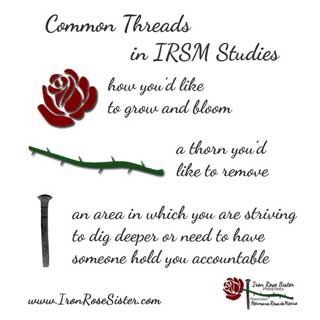 “Thanks for listening to me. I feel better even for just having talked about it.” This expression of thanks came from a sister with whom I had a lengthy, tearful conversation. She had shared some things that were weighing on her—things affecting her family.
“Thanks for listening to me. I feel better even for just having talked about it.” This expression of thanks came from a sister with whom I had a lengthy, tearful conversation. She had shared some things that were weighing on her—things affecting her family.When we verbalize what we are going through, to God and to others, we alleviate the weight, we minimize the pain, and we lower the level of intensity. Also, when we share the burden of what we are carrying, we remember that we are not alone (Gal. 6:1-2).
When we bottle it all up, we can suffer from what I call “pressure cooker syndrome.” If we keep it all inside, the moment will come when we cannot handle it anymore and we will explode, thus creating a huge mess that we are cleaning up for weeks—all over the kitchen and all throughout our lives.
On the other hand, when we talk about it, in prayer, we release some of the pressure. We remember that we are never alone, and that God always listens. Therefore, prayer is one of the most powerful ways to alleviate stress, express frustration, rejoice, and find peace.
Prayer is one of the opportunities to deepen our intimacy with God. The constant contact and communication with our Creator, Father, and Great Physician are vital for our wellbeing. And when we give everything over to the Great I AM, we keep our eyes fixed on the Whole... not just our part.
In addition, prayer is an opportunity to deepen our relationships with one another. When we pray together, we join as one voice in thankfulness, petition, and intercession. My Iron Rose Sisters encourage me through their prayers for me and for others.
We pray about the ways in which we want to grow or bloom. We pray that God will eliminate the thorns we recognize and that He will reveal the ones we don’t yet see. We give thanks to God for the opportunity to deepen our friendship as iron sharpening iron.
We share burdens in prayer and when we join in prayer, we strengthen the bonds between the different parts of the Whole.
Thank you for being an integral part of the Whole by joining with us in prayer during our Prayer Month!
-
Prayers of Faith
Written by Johanna Zabala, volunteer with Iron Rose Sister Ministries in Ecuador
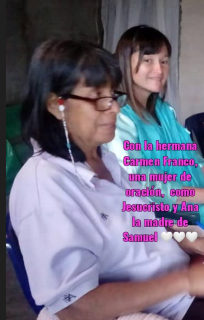
Rejoice always, pray continually, give thanks in all circumstances; for this is God’s will for you in Christ Jesus. (I Thessalonians 5:16-18 NIV)
It is comforting to live according to what is set out in this passage, since the joy of the Lord is our strength through today's trials.
I believe that constant prayer goes deep within us, living out the desire to be in communication with, and linked to, the Power of God at all times. Then that communication and intimacy with God through prayer becomes a full part of us that truly unites us with Him.
Knowing how to be thankful for everything, whether good or bad, teaches, serves, and helps us to grow in faith, remembering what Romans 8:28 says. “And we know that for those who love God all things work together for good, for those who are called according to his purpose.”
When we see both the will of God and ours, we know they must be intertwined with the Holy Spirit because the Heavenly Father wants to give us the best; and what is best for us is edification, as 1 Corinthians 10:23 says. Living in the will of God builds the character of Christ in each one of us, and that is why it should be a priority to seek His perfect will through absolute communication with the Maker of Life.
I faithfully believe that prayer will bring perfect and essential intimacy with the Heavenly Father, that communication with others will be achieved, and that we will radiate Christ through our faith and dedication as indicated in Galatians 2:20.
I have been crucified with Christ. It is no longer I who live, but Christ who lives in me. And the life I now live in the flesh I live by faith in the Son of God, who loved me and gave himself for me.
Knowing and loving the Lord, and as a follower of Christ, His teachings on prayer are of great inspiration to me. In Luke 22:42 NLT, the Lord Himself says, “Father, if you are willing, please take this cup of suffering away from me. Yet I want your will to be done, not mine.” We see here that although on many occasions our will is different than the will of God, we must seek the Lord’s will every day. In times of tribulation, His will is perfect and we will only understand it and make it a reality when we are in constant communication with Him.
Everything Jesus did to save us certainly was not easy for Him; but His immense love, obedience, and faith led Him to fulfill the will of the Father and not His own as a human.
Another great prayer inspiration for me is Hannah, Samuel's mother, as described in 1 Samuel chapter 1, verses 1-28. Hannah, full of faith in her heart, was constant and very specific in her prayers. She ultimately received her desired answer—having a child—despite her advanced age and sterility, then offered him to the service of God in gratitude for the favor granted.
On this earth, through the Holy Spirit that unites us, many brothers and sisters in Christ Jesus teach us to be unwavering servants of faith through prayers to God.
Today, I remember, with great admiration and respect, Sister Carmen Franco, a reverent, faithful, and fervent woman of prayer. Sister Carmen grew up in a Christian home, describing her life as one full of great battles. Even so, she obtained material blessings, but more importantly, spiritual blessings.
One day in 2017, as she was praying about her need to meet with the Lord's church but not knowing where to go, some members of the Church of Christ La Mesa de Los Indios, in Mérida, Venezuela, knocked on her door and invited her to their worship service. She accepted their invitation. When she attended, she arrived with a heart full of gratitude because her prayers had been answered.
Beloved Sister Carmen never stopped meeting with the congregation. Even during the pandemic, she continued to attend. She would say, “God with us, nothing against us.” She was vigilant, following Covid guidelines when attending all gatherings. Her valuable example is inspirational because she was praying each time we visited her. She taught us to strengthen, as a Christian family, the need for prayer as a means of daily communication with the Lord, through every circumstance.She always prayed for everything and everyone. Without a doubt, Sister Carmen Franco inspired us with her commitment to prayer.
Although her living conditions were sparce, she was constantly grateful and shared what the Lord gave her. Hers was a house of prayer; she lifted everything to the Father.
Sister Carmen went to be with the Lord on December 31, 2021, praying and praising the King of Kings, who answered her prayers for a peaceful end.
Dear sisters, let us be women of prayer with hearts full of faith. Will we be willing to pray without ceasing?
-
Praying for Obedience
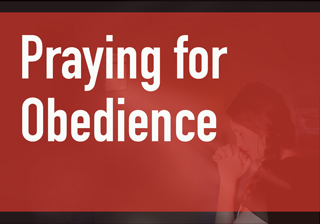 Prayer in and of itself is an act of obedience and submission. We are commanded to pray continually (1 Thes. 5:16). Jesus taught us how to pray (Matt. 6:5-15; John 17). His examples of public and private prayer, personal prayers and prayers on behalf of others, heartfelt prayers as a cry for relief, and simple prayers of thanks demonstrate that there is no one way to “pray continually.” It is better described as a life of prayer or a constant communication with God.
Prayer in and of itself is an act of obedience and submission. We are commanded to pray continually (1 Thes. 5:16). Jesus taught us how to pray (Matt. 6:5-15; John 17). His examples of public and private prayer, personal prayers and prayers on behalf of others, heartfelt prayers as a cry for relief, and simple prayers of thanks demonstrate that there is no one way to “pray continually.” It is better described as a life of prayer or a constant communication with God.This month, we are grateful for those who have joined us in prayer on behalf of Iron Rose Sister Ministries. As you pray for us, I ask that you also pray for me personally and the ministry as a whole to be obedient to God’s calling and vision for us.
Late last year, I was given the word “obedience” by the Spirit. I believe it was in preparation for the current project of the book, Single and Lovin’ It, Mostly. As I have continued to work obediently and prepare diligently for this task, the temptation to quit has been strong.
Trust and obey. For there’s no other way to be happy in Jesus, but to trust and obey.
The chorus of that hymn echoes in my mind as one part of me wants to shy away into a shell of self-protection. Another part of me wants to shout from the mountaintops of all God has done in the lives of many awesome single women.
Yet as I am tasked with imparting God’s wisdom and sharing it from the perspective of single women, I am humbled and recognize that I can, in no way, speak for others and tell their stories. I cannot speak on behalf of all single women to give practical advice for how to address some of the challenges faced by single and single-again women in our church.
God has not asked me to speak on His behalf nor to speak for all single women. He has asked me to be obedient and to be His instrument.
I am grateful to not only be able to speak from my own experience, but also from the experiences of others with whom I have walked. I am even more grateful that God sits at the head of the table where we all sit to have this conversation.
As we draw our focused month of prayer to a close, and as we pray together for the project of the current book, I encourage you to pull up a seat at the table. Join in the conversation and pray with all of us that God will help all of us to be obedient.
Thanks for being obedient prayer warriors with us!
3 For though we live in the world, we do not wage war as the world does. 4 The weapons we fight with are not the weapons of the world. On the contrary, they have divine power to demolish strongholds. 5 We demolish arguments and every pretension that sets itself up against the knowledge of God, and we take captive every thought to make it obedient to Christ. (2 Cor. 10:3-5)
-
Prophecy and Fulfillment
 Written by Deanna Brooks, volunteer with Iron Rose Sister Ministries in Arkansas
Written by Deanna Brooks, volunteer with Iron Rose Sister Ministries in ArkansasDecember… it’s the time of year when people around the world turn their thoughts to a small village in what is now the nation of Israel. While Scripture never tells us when Jesus was born, we take this opportunity to share His complete story with the world. Jesus, the Christ… the promised Messiah… is much more than the Baby born in Bethlehem. He is our Savior, the One sent to redeem us from the evils of Satan.
In this lesson you will find groups of scriptures after a statement about the Messiah. Those from the Old Testament will be prophecy, and the New Testament scriptures that follow are fulfillment of those prophecies.
Before the foundation of the earth, Paul tells us that God set this plan into place, that a Redeemer would come to restore the relationship that was broken by Satan in the Garden of Eden (Eph. 1:4.) There are over 300 Old Testament prophecies for the coming Messiah. In the New Testament we read how Jesus, born in Bethlehem, raised in Nazareth, was the fulfillment of those many years of prophecies.
The first set of prophecies and fulfillment are about the birth of our Lord. Early in Scripture we read of the promised Messiah and His birth:
Blessings would come through Abraham.
“Now the LORD said to Abram, “Go from your country and your kindred and your father's house to the land that I will show you. And I will make of you a great nation, and I will bless you and make your name great, so that you will be a blessing.” (Genesis 12:1-2)
“And all the prophets who have spoken, from Samuel and those who came after him, also proclaimed these days. You are the sons of the prophets and of the covenant that God made with your fathers, saying to Abraham, and in your offspring shall all the families of the earth be blessed.”(Acts 3:24-25)
“And the Scripture, foreseeing that God would justify the Gentiles by faith, preached the gospel beforehand to Abraham, saying, “In you shall all the nations be blessed.””(Galatians 3:8)
A virgin would have a son.
“Therefore the Lord himself will give you a sign. Behold, the virgin shall conceive and bear a son, and shall call his name Immanuel.” (Isaiah 7:14)
“And Mary said to the angel, “How will this be, since I am a virgin?””(Luke 1:34)
This promised Child would be born in Bethlehem.
“But you, O Bethlehem Ephrathah, who are too little to be among the clans of Judah, from you shall come forth for me one who is to be ruler in Israel, whose coming forth is from of old, from ancient days.” (Micah 5:2)
“When Herod the king heard this, he was troubled, and all Jerusalem with him; and assembling all the chief priests and scribes of the people, he inquired of them where the Christ was to be born. They told him, “In Bethlehem of Judea, for so it is written by the prophet: “‘And you, O Bethlehem, in the land of Judah, are by no means least among the rulers of Judah; for from you shall come a ruler who will shepherd my people Israel.’” (Matthew 2:3-6)
The ministry of the promised Messiah would be special, different from Old Testament prophets:
The Messiah would have a forerunner.
“A voice cries: “In the wilderness prepare the way of the LORD; make straight in the desert a highway for our God.”” (Isaiah 40:3)
“He said, “I am the voice of one crying out in the wilderness, ‘Make straight the way of the Lord,’ as the prophet Isaiah said.””(John 1:23)
“This is he of whom it is written, “‘Behold, I send my messenger before your face, who will prepare your way before you.’ Truly, I say to you, among those born of women there has arisen no one greater than John the Baptist….””(Matthew 11:10-11)
The Messiah would have a miraculous ministry.
“Then the eyes of the blind shall be opened, and the ears of the deaf unstopped; then shall the lame man leap like a deer, and the tongue of the mute sing for joy…” (Isaiah 35:5-6)
“And Jesus answered them, “Go and tell John what you hear and see: the blind receive their sight and the lame walk, lepers are cleansed and the deaf hear, and the dead are raised up, and the poor have good news preached to them.”(Matthew 11:4-5)
“Now Jesus did many other signs in the presence of the disciples, which are not written in this book; but these are written so that you may believe that Jesus is the Christ, the Son of God, and that by believing you may have life in his name.” (John 20:30-31)
The Messiah would be despised and rejected.
“He was despised and rejected by men, a man of sorrows, and acquainted with grief; and as one from whom men hide their faces he was despised, and we esteemed him not.” (Isaiah 53:3)
“When they heard these things, all in the synagogue were filled with wrath. And they rose up and drove him out of the town and brought him to the brow of the hill on which their town was built, so that they could throw him down the cliff.” (Luke 4:28-29)
“So they picked up stones to throw at him, but Jesus hid himself and went out of the temple.” (John 8:59)
The life of this Messiah would end with death and resurrection:
They would cast lots for His clothing.
“they divide my garments among them, and for my clothing they cast lots.” (Psalm 22:18)
“When the soldiers had crucified Jesus, they took his garments and divided them into four parts, one part for each soldier; also his tunic. But the tunic was seamless, woven in one piece from top to bottom, so they said to one another, “Let us not tear it, but cast lots for it to see whose it shall be.” This was to fulfill the Scripture which says, “They divided my garments among them, and for my clothing they cast lots.””(John 19:23-24)
His hands and feet would be pierced.
“…they have pierced my hands and feet.”(Psalm 22:16b)
“So the other disciples told him, “We have seen the Lord.” But he said to them, “Unless I see in his hands the mark of the nails, and place my finger into the mark of the nails, and place my hand into his side, I will never believe.””(John 20:25)
“See my hands and my feet, that it is I myself.”(Luke 24:39a)
None of His bones would be broken.
“He keeps all his bones; not one of them is broken.”(Psalm 34:20)
“But when they came to Jesus and saw that he was already dead, they did not break his legs.”(John 19:33)
The Messiah would not remain in the grave.
“For you will not abandon my soul to Sheol, or let your holy one see corruption.” (Psalm 16:10)
“And as they were frightened and bowed their faces to the ground, the men said to them, “Why do you seek the living among the dead? He is not here, but has risen. Remember how he told you, while he was still in Galilee, that the Son of Man must be delivered into the hands of sinful men and be crucified and on the third day rise.””(Luke 24:5-7)
The story of Jesus our Redeemer shows the marvelous love that that our Heavenly Father has for us.
Our Savior is not just the Baby born in Bethlehem. He said, “I am the way, and the truth, and the life. No one comes to the Father except through me” (John 14:6),and He has gone to prepare a place for us. (John 14:1-3)
We give thanks for our promised Messiah, the fulfillment of prophecy and our Way to the Father.
[All scriptures are ESV]
-
Relationships through which I have taught or learned
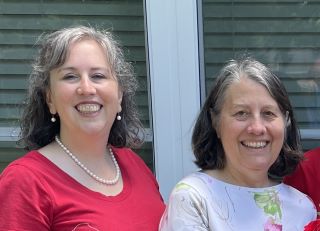 Written by Michelle J. Goff, with her mom, Jocelynn Goff
Written by Michelle J. Goff, with her mom, Jocelynn GoffThe oldest daughter of a college professor and elementary teacher, my mom grew up learning through at least two different styles of teaching. Not all teaching was formally imparted, of course. My mom never took a speech class from Dr. Brown at Miami-Dade Community College. She never sat in her mom’s classroom during regular school hours, but she did spend time there after school while her mom prepared for the next day’s instruction.
It is no surprise that my mom became a teacher herself. She is a natural teacher and gifted storyteller. Her students would sit up straighter when she offered a “lagniappe story.” Lagniappe is French for “a little something extra,” which meant that this story would not be on the test!
In contrast, when my granddad would pepper us granddaughters with Bible trivia questions during our Christmas visits, he emphasized those of greater importance by saying, “This one will be on the final exam.” What I most learned from those “tests” was his love for Bible study and his diligent commitment to finding little-known jewels in Scripture.
Years later, our conversations have been more give-and-take. I have shared biblical nuggets of truth that I’ve discovered with a similar passion to share it with others. Similarly, my mom and I have transitioned from being exclusively mother and daughter to being Christian sisters and partners in the gospel. The teaching and learning matured and became more mutual.
As you know, our teaching and learning does not come exclusively through teachers, nor through our families. Prayerfully, we seek to be surrounded by others who will invest in us, as well as those with whom we can build relationship. Pivotal teachers can transform our relationship with a certain subject matter… inspiring us to persevere or give up. Close friends teach us what it means to laugh, as we also learn what it means to forgive. Neighbors teach us kindness as we learn how to be a good neighbor ourselves.
There are also those who teach through their words and actions, unaware of how many are watching, learning from their example. This is especially true of our Christian walks. We must be careful to practice what we preach, and we cannot teach what we have not yet effectively learned.
When I asked my mom about a relationship through which she has taught or learned, A.R. Kepple was the first person that came to mind. His simple teaching was a seed planted and watered, week after week. They met at the Downtown Church of Christ in Kansas City, Missouri, the new congregation her parents helped establish in the early 1960’s.
After teaching the children for 20-30 minutes on Sunday evenings, Brother Kepple would invite 7-year-old Jocelynn to join him on the front row during the songs and sermon. After reminding her to mind her manners, her parents granted permission to sit with this retired preacher in his late 70’s.
Once settled with her feet not quite touching the floor, while waiting for the singing to start, Brother Kepple would open his Bible to Matthew 5 and read, “You are the salt of the earth. You are the light of the world,” pointing to each sentence as he read them.
“He told me that every time I sat with him, and it made an impression on me and planted a seed in my mind and heart and spirit,” Mom recalled. He lived out the teaching he repeated.
Who is someone through whom you have learned what it means to be a Christian? What has it looked like for you to teach others what it means to follow Christ?
-
Relationships through which I have taught or learned
Written by Michelle J. Goff, with her mom, Jocelynn Goff
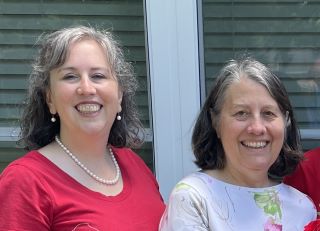
The oldest daughter of a college professor and elementary teacher, my mom grew up learning through at least two different styles of teaching. Not all teaching was formally imparted, of course. My mom never took a speech class from Dr. Brown at Miami-Dade Community College. She never sat in her mom’s classroom during regular school hours, but she did spend time there after school while her mom prepared for the next day’s instruction.
It is no surprise that my mom became a teacher herself. She is a natural teacher and gifted storyteller. Her students would sit up straighter when she offered a “lagniappe story.” Lagniappe is French for “a little something extra,” which meant that this story would not be on the test!
In contrast, when my granddad would pepper us granddaughters with Bible trivia questions during our Christmas visits, he emphasized those of greater importance by saying, “This one will be on the final exam.” What I most learned from those “tests” was his love for Bible study and his diligent commitment to finding little-known jewels in Scripture.
Years later, our conversations have been more give-and-take. I have shared biblical nuggets of truth that I’ve discovered with a similar passion to share it with others. Similarly, my mom and I have transitioned from being exclusively mother and daughter to being Christian sisters and partners in the gospel. The teaching and learning matured and became more mutual.
As you know, our teaching and learning does not come exclusively through teachers, nor through our families. Prayerfully, we seek to be surrounded by others who will invest in us, as well as those with whom we can build relationship. Pivotal teachers can transform our relationship with a certain subject matter… inspiring us to persevere or give up. Close friends teach us what it means to laugh, as we also learn what it means to forgive. Neighbors teach us kindness as we learn how to be a good neighbor ourselves.
There are also those who teach through their words and actions, unaware of how many are watching, learning from their example. This is especially true of our Christian walks. We must be careful to practice what we preach, and we cannot teach what we have not yet effectively learned.
When I asked my mom about a relationship through which she has taught or learned, A.R. Kepple was the first person that came to mind. His simple teaching was a seed planted and watered, week after week. They met at the Downtown Church of Christ in Kansas City, Missouri, the new congregation her parents helped establish in the early 1960’s.
After teaching the children for 20-30 minutes on Sunday evenings, Brother Kepple would invite 7-year-old Jocelynn to join him on the front row during the songs and sermon. After reminding her to mind her manners, her parents granted permission to sit with this retired preacher in his late 70’s.
Once settled with her feet not quite touching the floor, while waiting for the singing to start, Brother Kepple would open his Bible to Matthew 5 and read, “You are the salt of the earth. You are the light of the world,” pointing to each sentence as he read them.
“He told me that every time I sat with him, and it made an impression on me and planted a seed in my mind and heart and spirit,” Mom recalled. He lived out the teaching he repeated.
Who is someone through whom you have learned what it means to be a Christian? What has it looked like for you to teach others what it means to follow Christ?
-
Restored Self-Esteem
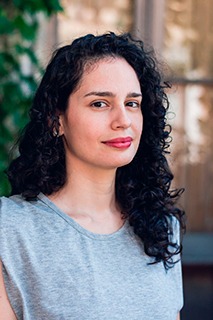 Written by Corina Diaz, volunteer with Iron Rose Sister Ministries in Argentina
Written by Corina Diaz, volunteer with Iron Rose Sister Ministries in ArgentinaIn the Bible we find many examples related to foreign women, and the case of the Samaritan woman was no exception. She was a woman who was confronted by Jesus even with the cultural implications: a woman who was evidence of a manipulated and reckless sexual life, in addition to belonging to the group of Samaritans, who were despised by the Jews, the woman had to hide in the middle of the day to look for her basic resources. It was at that moment that the encounter with Jesus arose. Has that ever happened to you—when you're at your worst, a ray of sunshine comes out of nowhere?
Here's a snippet of the story:
A woman, a Samaritan, came to draw water. Jesus said, “Would you give me a drink of water?” (His disciples had gone to the village to buy food for lunch.) The Samaritan woman, taken aback, asked, “How come you, a Jew, are asking me, a Samaritan woman, for a drink?” (Jews in those days wouldn’t be caught dead talking to Samaritans.) Jesus answered, “If you knew the generosity of God and who I am, you would be asking me for a drink, and I would give you fresh, living water.” The woman said, “Sir, you don’t even have a bucket to draw with, and this well is deep. So how are you going to get this ‘living water’? Are you a better man than our ancestor Jacob, who dug this well and drank from it, he and his sons and livestock, and passed it down to us?” Jesus said, “Everyone who drinks this water will get thirsty again and again. Anyone who drinks the water I give will never thirst—not ever. The water I give will be an artesian spring within, gushing fountains of endless life.” The woman said, “Sir, give me this water so I won’t ever get thirsty, won’t ever have to come back to this well again!” (John 4:7-15)
The text is not very clear about the current situation of the woman, but if you continue the story, you will find that she was in sin, and even so, Jesus approached her during that difficult time. We can recognize it was a tough moment when she was alone looking for water, in addition to the fact that she likely did not have emotional stability. The chapter describes that she had five husbands, which indicates that she was a wounded woman, probably with broken self-esteem. Some of us have gone through emotional breakups when our identity was at stake. But do you know what the most beautiful part is? Jesus came to her to restore her! Just as He comes to us today to offer us a new identity and to show us our purpose here on earth.
So don’t be embarrassed to speak up for our Master or for me, his prisoner. Take your share of suffering for the Message along with the rest of us. We can only keep on going, after all, by the power of God, who first saved us and then called us to this holy work. We had nothing to do with it. It was all his idea, a gift prepared for us in Jesus long before we knew anything about it. But we know it now. Since the appearance of our Savior, nothing could be plainer: death defeated, life vindicated in a steady blaze of light, all through the work of Jesus. (2 Tim. 1:8-9)
If you find yourself alone or if you still feel alone in a crowd, in a place that is not your land, if you have been hurt or your identity has been at stake, I want to tell you that we will always have an opportunity to renew ourselves, to shine and to be new women in Jesus!
#IronRoseSister #HIStories #foreigners #light #restoredselfesteem #guestwriter #blog
-
Seeing is Believing from the I AM’s Perspective
 (taken from I already AM: Testimonies of Belief in the Great I AM, chapter 1)
(taken from I already AM: Testimonies of Belief in the Great I AM, chapter 1)
The illustration is made of five blind Chinese men who were asked to describe an elephant.
The first man stepped up to the elephant, felt with his hands, smelled with his nose and said, “It is long and narrow, very flexible, like a snake, but with a little brush on the end. It is also very stinky.”
“Long and narrow?” responded the second man. “It is more like a thick hose that, ay! Sprays out the end!”
“It is no hose at all,” said the third man, the shortest of the five. “It is most like a tree, rough and solid. Much thicker than a hose.”
“If my friend declared it a tree,” interjected the fourth man. “I most definitely have the biggest leaf I have ever encountered. It is thin and waves in the wind.”
“No. You all have it wrong. It is broad and wide, like a wall,” concluded the fifth man.
Which man was correct? And which man was wrong?
How does God see the elephant?
How are we like the blind men?
Only God has the clear perspective of the big picture. Only God is able to address the whole elephant. What we are dealing with... our questions in life... They are barely a wrinkle on the elephant’s knee.
Reflection: Am I trusting the I AM with the whole elephant?
We will be looking through the lens of the I AM because it matters not what the world says, but rather what the Word says.
And when I keep my eyes fixed on the I AM, when I strive to see things from His perspective, I avoid the trap of the futile searches for answers, identity, purpose, provision, or whatever else I am seeking. Because everything else falls short of the I AM. -
Seeing the I AM Clearly
Seeing the I AM Clearly
Written by Kara Benson, volunteer with Iron Rose Sister MinistriesA few months ago, I had the blessing of attending the Iron Rose Sister Ministries Destination Retreat. It was an incredible experience to be surrounded by so many Spanish-speaking women of faith! I loved meeting, learning from, and growing with these Christian ladies. Hearing their personal testimonies was encouraging and worshipping together in a bilingual context was rejuvenating.
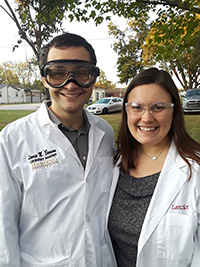
In one of her keynote addresses, Michelle made the following point: our little “I” gets in the way of seeing the great “I AM.” That statement stuck in my mind. The more I processed it, the more I realized how true it is! How many problems are caused—directly or indirectly—by me getting in the way?
A great example of this pitfall is in marriage. I love my husband. We share a lot of the same beliefs, values, opinions, and interests in life. However, that does not mean that he is me. But so often, I forget that. I expect him to think, feel, and react the same way I do. I expect him to prioritize, plan, organize a closet, load a dishwasher, set a thermostat, and decorate a Christmas tree the same way I would. And trust me, we’ve had our fair share of conflicts because of it!
It can be the same with God. Sometimes, I forget that God is not like me. From his beautiful masterpieces in nature, I know He is creative. From His amazing love letter written in three languages, I know He desires relationship. From the six days of creation followed by His cessation of labor on the seventh, I know He values hard work and rest.
But God is not like us (Psalm 50). He doesn’t get hungry; in fact, He doesn’t need anything at all. The whole world and everything in it belong to Him. God is holy. He is never indifferent to sin, even when we have a difficult time staying serious about it. God’s word judges the thoughts and attitudes of the heart, whereas we cannot even judge ourselves, let alone our neighbor. God always loves us, even when others let us down. People don’t always have our best interest at heart, but God always looks out for our long-term good. We want forgiveness without a change in behavior, blessings without obedience, and love without sacrifice, but God does not. God is a merciful, forgiving, and loving consuming fire who hates sin and destroys his enemies. And that is hard to wrap my head around.
We don’t get closer to God by digging deeper into ourselves or ingesting the teachings of men. When we try to see God through the lens of ourselves, we will inevitably make God into our own image. To see the I AM clearly, I must remove myself from the picture. I must stop trying to project myself and what I like onto God and instead allow Him to define Himself through His word. It’s 2020. Are you seeing clearly? -
Sharing and Forgiving Difficulties
Written by Johanna Zabala, volunteer with Iron Rose Sister Ministries in Ecuador
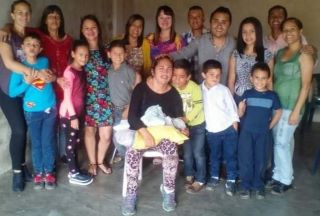
The beautiful biblical passage in Galatians 6:2 encourages me to continue fulfilling the Christian mission of bearing the burdens of my sisters in Christ, my family, and others with whom I have relationships. Based in the love of Christ, this scripture is an exhortation of obedience, bonding, communication, and fellowship with each other.
When I say "burdens," I mean the various difficulties and adversities that as human beings and followers of Christ we will encounter in each stage of life, both physical and spiritual.
Over time, we may realize that some burdens began in our childhood. This affirms the great importance of a healthy childhood, starting as early as conception. Early childhood is the foundation of our adult lives. All along the way, we are soul, body, and heart, made with love and an existential purpose.
When thinking of ourselves as a soul, we have a spirit of life that we do not see, which makes it challenging for us to care for and understand. We dedicate a little more care to the physical or external body. However, we take only minimal care of our internal organs. We also have feelings, which flow from the human heart. The word of God says that they are deceitful, as Proverbs 4:23 tells us. We must keep our hearts pure in accordance with Matthew 5:8.
These three areas of life need to be attended to and cared for equally to achieve the first of the greatest commandment of the Lord Jesus. Faced with this need, structuring soul, body, and heart to achieve their complete harmony will present certain challenges or difficulties toward the harmony between the three. Therefore, it will take experience, acceptance, strength, and above all, a lot of wisdom and love to overcome this challenge.
Overcoming the difficulties to achieve this harmony requires walking together through each experience, obstacle, and blessing. We can turn this process into an opportunity, rather than a burden, to understand the reason for the way we interact with our peers. In interpersonal relationships, we can choose to understand, see, and recognize in others our own weaknesses and strengths, which will allow us to be better people.
Furthermore, Matthew 11:28-30 teaches that we can all go into Jesus’ presence. In Him, we learn and rest. We are invited to bear the yoke of Christ and to learn of His meekness and humble heart. The purpose is to find rest for our souls through full dependence on the Lord. Jesus helps me to observe my surroundings daily and share important challenges and sufferings with my physical and spiritual family. These are clusters of constant personal and spiritual growth.
By working with, getting involved with, and getting to know each member of the Church, we reflect the great need we have to help, build up, and love one another, as Jesus Christ Himself taught.
The Lord Jesus calls us to salvation but also invites us to heal the soul. Heal! From what? It may be from an unsuccessful way of living taught by our earthly parents, from which are called to be purified and transformed, as we read in 1 Peter 1:18.
As someone once said, “We see faces; we do not know hearts.” The prophet Isaiah, in chapter 1 and verse 5, emphasizes that "Your whole head is injured, your whole heart afflicted"(NIV). This reminds us that, despite having been born again in the waters of baptism for a new life, there may still be situations that have occurred but not yet been consciously healed.
I know adults with significant wounds from their childhood who still show significant gaps in their relationships. One study states that approximately 89% of people with voids in their relationships were abandoned by a parent. Therefore, within the home and the church it is urgent to help understand the importance of forgiving our earthly parents for:
1. Being completely absent
2. Being very harsh in parenting
3. Not exercising authority or not being there, especially in the early stages of childhood
4. Being unloving
5. Not paying attention
6. Demonstrating immaturity
Sadly, those who suffer emptiness in interpersonal relationships agree that the wounds they feel result from not having grown up with a strong family nucleus. This results in difficulties raising their own children and even more so, an inability to assert themselves in communication with parents, spouses, colleagues, friends, and even with our Heavenly Father.
In conclusion, as daughters, let us wholeheartedly forgive the inexperience and the hurts caused by parents or caregivers as soon as possible in order to be healed. And, if we have children, let’s not hurt them. A commitment like this requires constant prayer and wisdom in the love of Christ. Let’s help each other in sharing and forgiving.
-
She Did What She Could
 I wish I could be there for you Friday, but I have to work.
I wish I could be there for you Friday, but I have to work.
I wish I could give more money in support, but I just had to replace the tires on my car.
I wish I could visit the five other people in the hospital, but I only made it to visit one. Is that showing favoritism?
I wish I could make homemade cupcakes and healthy snacks for my kid’s class, but all I could do was pick up carrot sticks and a box of cookies.Do you ever feel guilty for not doing enough? Do you ever feel judged by others for doing the wrong thing?
No one can do it all. We are not superwomen, nor are we expected to be.
And only God knows our heart and our motivations.Check out the following story from Mark 14:3-9.
3 And while he was at Bethany in the house of Simon the leper, as he was reclining at table, a woman came with an alabaster flask of ointment of pure nard, very costly, and she broke the flask and poured it over his head. 4 There were some who said to themselves indignantly, “Why was the ointment wasted like that? 5 For this ointment could have been sold for more than three hundred denarii and given to the poor.” And they scolded her. 6 But Jesus said, “Leave her alone. Why do you trouble her? She has done a beautiful thing to me. 7 For you always have the poor with you, and whenever you want, you can do good for them. But you will not always have me. 8 She has done what she could; she has anointed my body beforehand for burial. 9 And truly, I say to you, wherever the gospel is proclaimed in the whole world, what she has done will be told in memory of her.”
In memory of this woman and in her honor, let’s celebrate those who “did what they could.” Jesus sees you. When you doubt yourself and when others seem to judge, remember this affirmation, “She did what she could.” Allow your best effort to be enough because God is the one who knows your heart and is the only one who is all-sufficient. He will make up the difference. God did what He could to make it possible for you to do what you can do—no less, no more.
Do not be discouraged if you feel that “all you can do” is your one small part. Every little bit makes a difference and together, through Christ, we can each do what we can.
-
Singleness
Written by a volunteer with Iron Rose Sister Ministries in the USA
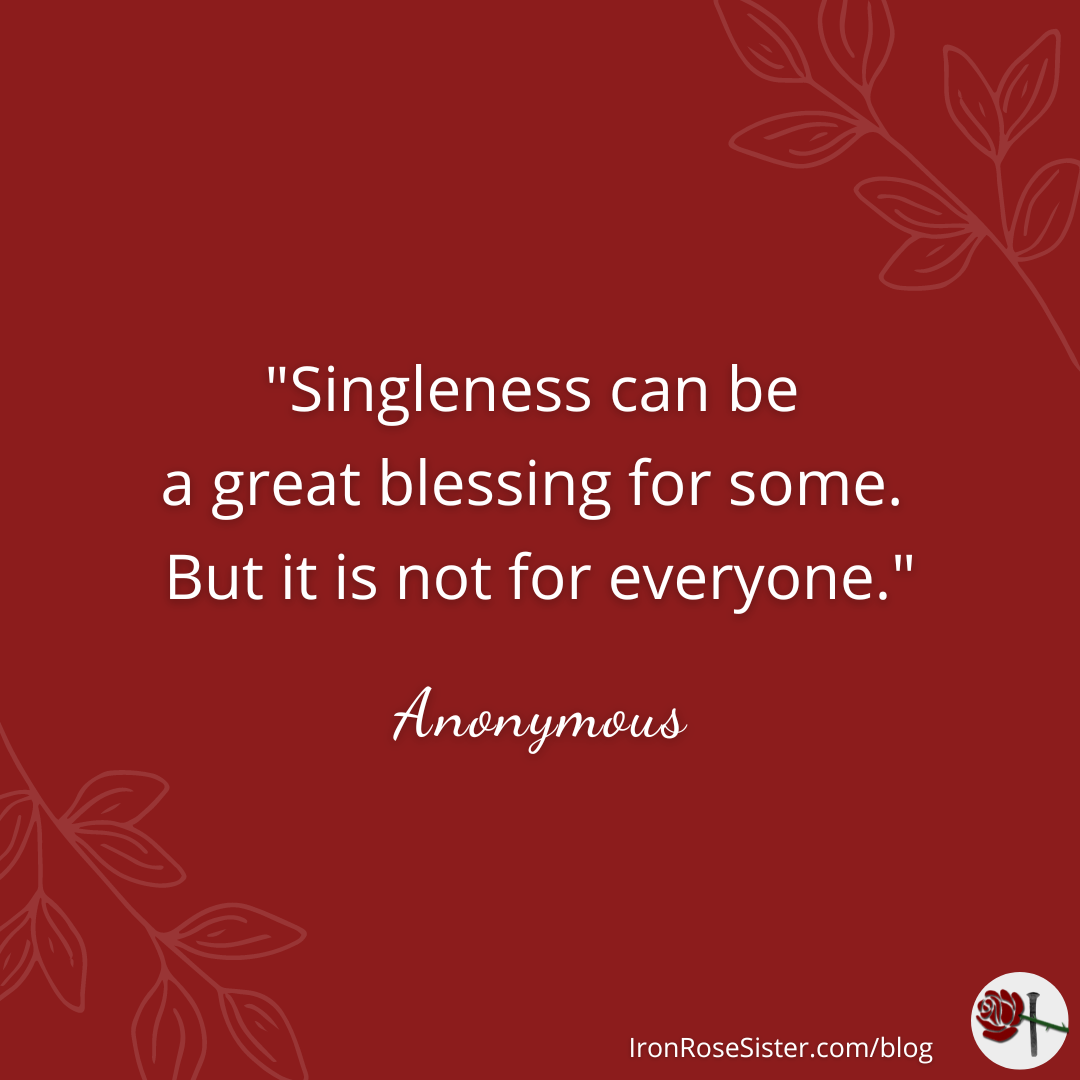
Singleness: quality or state of being single, unmarried.
This is recent for me. I was married for many years to a warrior for the Lord and lost him to COVID 18 months ago. It feels so strange to try and accept this: I am single.
Paul considers his singleness as a gift from God. In 1 Corinthians 7, he discusses marriage and sex and singleness in verses 1 and 2 (ESV), “It is good for a man not to have sexual relations with a woman. But because of the temptation to sexual immorality, each man should have his own wife and each woman her own husband.”
A few verses later in verses 6-9 (NIV) Paul says,
I say this as a concession, not as a command. I wish that all of you were as I am. But each of you has your own gift from God; one has this gift, another has that. Now to the unmarried and the widows I say: It is good for them to stay unmarried, as I do. But if they cannot control themselves, they should marry, for it is better to marry than to burn with passion.
Why would Paul see singleness as a gift? He explains it in verses 32-34, “I want you to be free from anxieties...” Being single gives us the ability to serve the Lord anywhere in the world, without having to consider whether our mate is also desirous of going to live where we feel called to. We are focused on serving God alone.
But in the beginning, in Genesis 2:18, God said, “It is not good for the man to be alone.” Paul thinks singleness is good so we can fully focus on serving God. But God knew it was not good for everyone.
I asked a good friend to share with me his thoughts on singleness. He was also married for a long time and has now been single longer than I have. He said, “It’s unnatural and it hurts.”
I agree.
God made us male and female for a reason; not just for procreation. Yes, that is a very important reason, to keep mankind alive and growing on this earth, but there is so much more to marriage than having children. After raising my children to adulthood and continuing to have the wonderful gift of marriage for many years, I long to have that relationship again; to have the daily love and support, camaraderie, laughter, physical touch, and just the joint shouldering of the burdens of everyday life together with a mate.
At this moment, a large part of me feels destroyed and empty, like a cherished old home that has been burned out and abandoned. But feelings aren’t facts. I know that I am not abandoned. My Father is always here with me, every minute of every day. When I lost my husband, my Dad in heaven gifted me with a tribe of godly friends who welcomed me (Rom. 15:7), loved me (Rom. 12:10), and encouraged me (Prov. 27:9).My tribe bore my weakness with me(Rom. 15:1-3).
God has also comforted me in surprising ways, like putting it on my heart to make a list of the burdens my husband doesn’t carry anymore. I read this list often and imagine how happy he is in paradise now (Rev. 21:4).
My Father reminds me how very fleeting life on earth in James 4:14b, “What is your life? For you are a mist that appears for a little time and then vanishes.” Compared to eternity, our lives here on earth are very short indeed. But they don’t feel short, especially when we are hurting.
I don’t know why God chose to take my husband home, nor how long I will have on this earth yet to live. Right now, the loneliness each night is like a black hole, threatening to swallow me entirely. It feels unnatural to be alone. And it hurts. So, I turn to my “Father of mercies and God of all comfort, who comforts us in all our affliction…” (2 Cor. 1:3-4 ESV).
I am still here. I don’t know why, but while I am, I will serve God, and follow His Word the best I can. So, I study about widowhood, “A wife is bound to her husband as long as he lives. But if her husband dies, she is free to be married to whom she wishes, only in the Lord” (1 Cor. 7:39).
Singleness and I are not friends. I have begun praying that God will grant me a godly man that I can love, and who will love me—someone to hold hands with as we cross the finish line of life together. For now, I can rest in Him as I wait, reminding myself of this passage often, “Be still and know that I am God” (Ps. 46:10).
My Dad in heaven is infinitely better than any earthly father at screening my dates, because He can see into their minds and hearts and knows their intentions. I am confident He will bring me just the right man if I move out of the driver’s seat (which is, frankly, difficult for me!), and instead allow Him to lead.
Singleness can be a great blessing for some. But it is not for everyone. The most important thing in this life is loving and serving our Creator with all our hearts and minds and souls and strength, whether single or married. And one day we can rejoice as we discuss these events together in heaven!
-
Surrender: Abraham’s Radical Change of Heart
 Written by Elise Siklosi, volunteer with Iron Rose Sister Ministries in Arkansas
Written by Elise Siklosi, volunteer with Iron Rose Sister Ministries in ArkansasThink of a time when you had to sacrifice something or give it up. Was it an event? A nail appointment or an important dinner? Maybe you had to give up the urge to snag that Snickers bar from the checkout aisle or – as I like to say – the impulse-buying aisle. Or maybe it was something bigger, like a job offering or interview. It wasn’t all that easy, was it?
There’s always that small tinge of discomfort in surrendering something that you have no desire to give up. Perhaps the thing you’re surrendering is much bigger than a Snickers bar. Maybe you’re currently in the process of surrendering an expectation of something that you had very high hopes of. Perhaps you’re surrendering a relationship, the potential for marriage, a loved one… the list could go on. People are, without a doubt, much more difficult to give up than just about anything. Abraham, a faithful follower of God, knows – all too well – what it means to surrender something incredibly close to him: his own son.
Abraham, like the rest of us as believers, was chosen, hand-picked by God, to be the father of many nations to come. There are multiple accounts throughout Genesis when God promises Abraham and his wife, Sarah, that they will have many descendants. In chapter 12, The Lord says to Abraham (Abram at the time),
“... I will make you a great nation, And I will bless you, And make your name great; And so you shall be a blessing…” (NASB, v. 2).
The funny thing about Abraham and his wife Sarah, is that this particular couple is veryold when they are promised these things. In fact, Sarah was even barren. In other words, there was, supposedly, no possible way that she could have a child. With this, Abraham had plenty of doubts and questions. With an impatient and unbelieving heart to God’s promise for children, he even conceived a child with Hagar, Sarah’s maid, because he was so desperate for His promise to be fulfilled. But God, in His faithfulness, was unwavering from His promise.
In Genesis 17:2, He, again, reminds Abraham of this sweet guarantee by saying, “I will establish My covenant between Me and you, And I will multiply you exceedingly.” In response to this, Abraham “fell on his face and laughed” in disbelief (17:17), for he was one hundred years old at this point in time. Even still, God responded with assurance, saying “I will establish My covenant with [your son] for an everlasting covenant for his descendants after him” (17:19). To no surprise does God fulfill His promise to Abraham in chapter 21. It reads,
“Then the LORD took note of Sarah as He had said, and the LORD did for Sarah as He had promised. So Sarah conceived and bore a son to Abraham in his old age, at the appointed time of which God had spoken to him.”What a beautiful statement! Isaac, the promised son, has finally been born. This just goes to show how unshakeable the faithfulness of our God is. It reminds me of Isaiah 55:11:
“So will My word be which goes forth from My mouth; it will not return to Me empty, Without accomplishing what I desire and without succeeding in the matter for which I sent it.”I mean, wow. The words of God hold such power! While Abraham, with his unbelieving heart, slept with another woman and even laughed in the face of God, the Lord’s faithfulness was unmoved. He provided Abraham with security and safety with His very words. Here’s the simple truth: they do not “return to [Him] empty.” As sweet as this is, the story of Abraham’s son doesn’t end here. In chapter 22, God asks something quite unexpected of Abraham, commanding him to “Take now your son, your only son, whom you love, Isaac, and [...] offer him there as a burnt offering on the one of the mountains of which I will tell you” (NASB, v. 2). I’m sorry… what? Did God not just fulfill His promise of a child to Abraham? He even makes sure to mention the fact that Isaac is Abraham’s “only son” that he loves dearly.
Oddly, Abraham responds to this command with obedience. There is no recorded complaint from him, compared to the previous chapters where there was an evident lack of trust in God. If anything, the way he reacts shows that this task of surrendering one of his most beloved relationships is of great importance to Abraham. Genesis 22:3 says that he “rose early in the morning” to prepare for the offering before setting off to the mountain to sacrifice Isaac. As someone who is absolutely not a morning person, this mission seems to me like it was insanely important to Abraham.
After tying Isaac to the altar, he raises his arm, knife in hand, to proceed with the sacrifice. But God interrupts in chapter 22:12, sending a messenger to command him saying, “Do not stretch out your hand against the lad, and do nothing to him; for now I know that you fear God. since you have not withheld your son, your only son, from Me.” He then rewards his faithfulness by providing Abraham with a ram to sacrifice in place of Isaac. I have tears in my eyes as I write this! To reflect on such a deep and resilient love for God absolutely boggles me. What kind of faith surrenders a human life for God? What kind of faith surrenders the one son that had been prayed over for years to God?
Let’s reflect on Abraham’s change of heart throughout his lifetime: He started off as a man whose heart was hardened. With his unbelief, came a lack of trust. And with a lack of trust, came an unwillingness to surrender anything to God… including his own expectations for God to uphold His promise to him.
He slept with Hagar because, to Abraham, “God is not a faithful God worth trusting.” Therefore, he took his own initiative with hopes of fulfilling a divine promise with a human “resolution.” A God-sized guarantee being satisfied by flesh? Never! By witnessing God’s faithfulness displayed through the birth of a son, Abraham’s heart went from hard and unbelieving, to soft and surrendered.
He was so confident in God’s unshakeable power that he was willing to give up anything for God… including Isaac! He found rest from turmoil in the power of God and in the fullness of His satisfaction. Abraham knew that God would sustain him and fulfill every need. Even when he couldn’t see what God was doing in the future, he could still trust God’s deep-rooted and secure plan. If a relationship with the Lord is worth diving this deep into, then surely it must be worth surrendering to with complete trust and confidence!
#IronRoseSister #HIStories #Abraham #trust #surrender #changeofheart #guestwriter
-
Teaching and Learning Styles
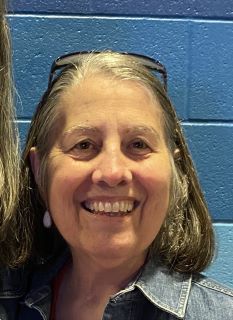 Written by Jocelynn Goff, mother of Iron Rose Sister Ministries’ Founder and Director Michelle J. Goff
Written by Jocelynn Goff, mother of Iron Rose Sister Ministries’ Founder and Director Michelle J. GoffWhat’s your learning style? I’ve been asked that question at several medical appointments. The nurse wanted to know how I would best receive the information and directions from the doctor.
There is purpose in knowing our own learning style for ourselves, in a classroom, our workplace, a doctor’s appointment, daily conversations, and more. There’s also purpose for understanding this in our relationships and interactions with others. When we interact with a child, family member, friend, neighbor, or coworker it is helpful if we can understand even a little bit of how they learn to have realistic expectations for their retaining the information we are sharing.
There are four basic types of learning styles: visual, auditory, read/write, and kinesthetic.
If I’m a visual learner, then the doctor’s approach could be to show me a picture of the affected part of my body or write a list of directions out for me. To help myself process and retain learning I could use a picture, a graph, a daily organizer, a list, or see a finished product. In relationships, I could utilize those same tools. Obviously, it would be a natural process and not a “let me teach you this way” kind of format.
For an auditory learner, the doctor may give verbal instructions and quite possibly ask me to repeat them back to him. To help myself or in relationships, I could possibly ask if the information can be repeated back either verbatim or by rewording it using their or my own words. A song can also be a useful tool for imparting information. Family stories passed down through the generations are an additional significant, powerful learning tool.
If read/write is my best learning style, then the doctor may share a website for me to research or give me a printed copy of the diagnosis and instructions. Additionally, I can seek other reliable sources in books, websites, journals, or other recommended documents. For myself and in relationships, rewriting the information or just reading it for myself are useful tools.
For a kinesthetic learner, a hands-on approach is best, so the doctor may use a model of the affected body part for me to touch and possibly a simulation of movements that are helpful in the healing process. For myself and in relationships, effective hands-on types of activities include drawing, cooking, eating, taking a hike alone or with a friend, planting a garden, or creating an artistic design.
God, who created learning styles, used all of them in the celebration of the Passover meal. Before Easter, I was reading about Pesach Seder (Passover meal) in an article our Bible class teacher shared. This part of the reading jumped out at me,
“…the Pesach Seder is one of the most carefully constructed learning experiences ever created. In an amazing combination of aural and tactile learning tasks, the Seder has something for everybody—a drink, food, symbols, prayers, songs, stories, philosophy, text study, simulations, ritual actions—all designed with one overall goal” to take each person at the Seder back to Egypt, to re-enact the dramatic Exodus story, to make each one of us feel as she or he had actually been redeemed from Mitzrayim (Egypt).”This exposure in all of the learning styles ensures that the overall goal is accomplished for each individual to experience Passover and its significant meaning.
Similarly, Jesus, as the Master Teacher, employed all of the learning styles. For the visual learner, He let His listeners visualize the birds of the air and the lilies of the field in Matthew 6:25-33. For the auditory learner, He gave the Sermon on the Mount in Matthew 5-7. For the read/write learner as He spoke to an expert in the Law, “What is written in the Law?” He replied, “How do you read it?” (Luke 10:26). For the kinesthetic learner, there are a plethora of examples, such as when He feeds the 5,000 (Mark 6:30). He even employs several styles at once when He draws with His finger on the ground (John 8:6). Jesus is truly the Master Teacher and gives us every opportunity to know Him and learn from His teachings in our own learning style.
The book, Called to Listen by Michelle J. Goff, employs the various learning styles through 40 days of listening: “to the Good Shepherd, the Creator, the Father, the Son, the Spirit, and through the five senses.” This may even expand your learning abilities in styles you’ve previously been unaware of that speak to you.
I encourage you to find your learning style and begin to recognize this in the relationships around you. I invite you to read Called to Listen to hear the message our Heavenly Father speaks “… through His Word, through nature, through Christian brothers and sisters, even through silence…” This book offers you prompts to use your five senses and explore your learning style.
So, are you primarily a visual, auditory, read/write, or kinesthetic learner? Share or demonstrate in the comments!
Footnote:
This Seder outline was adapted from The Art of Jewish Living: The Passover Seder by Dr. Ron Wolfson, published by the Federation of Jewish Men’s Clubs and the University of Judaism, 1988. Additions and edits by Daniel B. Stockstill, 1999. -
Teaching and Learning through Relationships
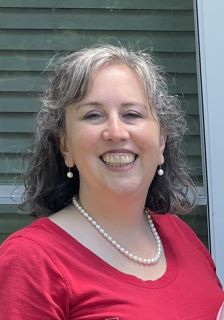 Written by Michelle J. Goff, Founder and Director of Iron Rose Sister Ministries
Written by Michelle J. Goff, Founder and Director of Iron Rose Sister MinistriesIn Matthew 28, we hear the final words of Jesus before His ascension. Verse 18 reminds us that all authority in heaven and on earth has been given to Him.
19 Therefore go and make disciples of all nations, baptizing them in the name of the Father and of the Son and of the Holy Spirit, 20 and teaching them to obey everything I have commanded you. And surely I am with you always, to the very end of the age. (Matt. 28:19-20)
“Go” and “make disciples” are the two commands of ultimate importance as Jesus’ final instructions. The two ways in which we fulfill the command to make disciples are baptizing them and teaching them. Then finally, we hear the promise that Jesus will continue to be with us. Amen!
These facets of the Great Commission are integrally connected to the Greatest Command: to love God and love others. Can we truly make disciples outside of relationship with God or others? The teaching would be limited to lists of instructions or rote information without relationship. “Teaching them to obey” is different than “telling them what to obey.”
I cannot properly teach someone how to make an arepa without first introducing them to this Venezuelan staple. I could tell them what to make, even provide detailed directions, but both of our levels of frustration will be high if I cannot demonstrate how to make it. Subsequently, if my pupil felt defeated and her arepas didn’t turn out well, she will be less likely to make them again on her own.
Conversely, if I explain how to make arepas, step by step, standing by her side and illustrating with my own dirty hands how to prepare the masa and form the arepas, when to flip them, and when they were ready to eat, my student will feel better equipped to continue in the process. Then, we sit down and continue our time together by eating and deepening our friendship, a memory is made, and a connection is built.
The next time my student friend wants to make arepas, she has been set up for success and, if she has a problem, she knows exactly who she can call! We even celebrate together when she sends me a picture of her family eating her imperfectly formed arepas. She is practicing and developing her skills. And she is not alone. Her growing confidence in how to follow the instructions has been encouraged by her teacher. They delight in sharing a good meal and both are inspired to do it again.
The teaching and the learning happened in relationship.
Iron Rose Sister Ministries’ vision is to equip women to connect to God and one another more deeply. The founding principles of that vision and our 2023 theme draw from the Greatest Command (Mark 12:30-31) and the Great Commission (Matt. 28:18-20), inspired by the imagery of Jesus as the True Vine and us as the branches called to bear fruit (John 15). We cannot fulfill any of those commands without relationship! Through the blog posts, virtual events, and other resources, we will emphasize the relational aspects of these three biblical texts: “Teaching and Learning through Relationships.”
First and foremost, our relationship with God is foundational.
4 Remain in me, as I also remain in you. No branch can bear fruit by itself; it must remain in the vine. Neither can you bear fruit unless you remain in me. 5 “I am the vine; you are the branches. If you remain in me and I in you, you will bear much fruit; apart from me you can do nothing. (John 15:4-5)
Secondly, the “much fruit” of our relationship with God will be more disciples, which brings us back to the Matthew 28 text. I love how God ties it all together and brings it full circle!
Thirdly, the ongoing relationships with God and with one another are reiterated throughout the remainder of the New Testament.Luke’s narration of the early church, Paul’s letters, Peter’s reminders, as well as John’s and James’ instructions all provide affirmation of the important of relationship.
If you are not familiar with these scriptures or have not known the blessing of these relationships, we invite you to connect with these promises and commands. Ladies, we especially want to illustrate these foundational truths in the ways God has called us to teach and learn through relationships.
This year, we will follow the same pattern established in 2022 for our blog posts. Tuesdays will describe teaching and learning through relationship(s) in the Bible. Thursdays will illustrate a similar relationship dynamic from one of our stories. Bible stories and God stories… there is so much to teach and to learn!
Thank you for joining us! We will continue to introduce the topic through Jesus’ own example in January. Then, February, our well-established prayer month, will continue the Bible stories and God stories, especially in our relationships and communication with God.
-
Thankful for Immanuel
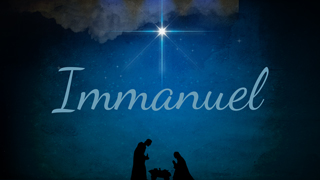 And God said, “I will be with you.” Exodus 3:12a
And God said, “I will be with you.” Exodus 3:12a*Written by Rachel Baker
On the rare days when my son is the only one at home with me, I know from the start of the day that we will be spending a lot of time in close proximity. It’s not that he always wants to do things with me, but he likes to know that I’m close by – just in case. If I’m being honest, I completely understand how he feels. There is comfort in knowing that the person who cares for you is right there with you, able to help when you need it.There are many times in scripture when we see the I AM extending this same comfort to His people. When the Lord tells Moses he is being sent to Pharaoh to bring the Israelites out of Egypt, Moses responds with doubt and fear: “Who am I that I should go?” (Exod. 3:11). This sounds a lot like my kids when they are nervous and doubt their own abilities: “But, I can’t do it!” The I AM reassures Moses by saying, “I will be with you” (Exod. 3:12). In the book of Judges, we see where Gideon is told to go and save Israel from Midian. In a reaction similar to Moses, he questions the Lord’s command, asking how he can do such a huge task. The I AM is consistent in His response: “I will be with you” (Judges 6:16).
In this season of thanksgiving, I am especially grateful for the ultimate example of God’s presence among us:
“...an angel of the Lord appeared to [Joseph] in a dream and said, ‘Joseph, son of David, do not be afraid to take Mary home as your wife, because what is conceived in her is from the Holy Spirit. She will give birth to a son, and you are to give him the name Jesus, because he will save his people from their sins.’ All this took place to fulfill what the Lord had said through the prophet: ‘The virgin will be with child and will give birth to a son, and they will call him Immanuel’ – which means, ‘God with us.’” Matthew 1:20b-23Not only did our Lord come down to live among us, He also promises to never leave us:
“And surely I am with you always, to the very end of the age” (Matt. 28:20b)
Just like my son is comforted by my presence, we can take comfort in knowing that when we need Him most, we are able to rest in the I AM who is with us... always.
Page 4 of 6

